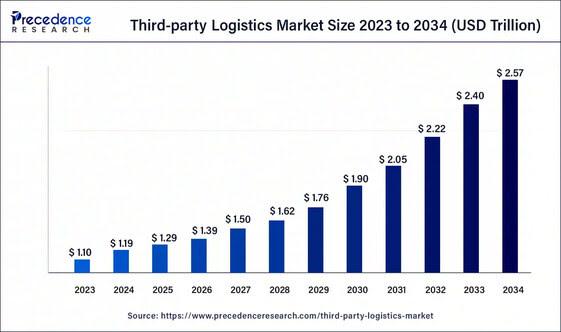Logistics outsourcing has become an essential solution for B2B and B2C companies looking to optimize their logistics in a constantly evolving e-commerce environment. By entrusting this task to a specialized service provider, companies can focus on their core business while improving their operational efficiency.
 e-commerce market evolution. [1]
e-commerce market evolution. [1]
Why outsource inventory management in e-commerce?
Reducing logistics costs
Outsourcing logistics helps reduce investments in logistics infrastructure, such as warehouses and personnel. Service providers use powerful tools to ensure better product traceability.
Flexibility in the Face of Fluctuating Demand
E-commerce is often subject to fluctuations in demand, particularly during sales periods or promotional events. Outsourcing offers increased flexibility to quickly adapt to these fluctuations without compromising service quality.
Improved Delivery Times
By leveraging a network of strategically located warehouses, logistics providers can reduce delivery times, meeting growing consumer expectations for speed.
Specific Benefits for B2B and B2C Companies
B2B: Logistics Suited for Large Volumes
B2B companies benefit from logistics management capable of handling large volumes with precision. The use of advanced WMS enables better supply planning and reduced errors, thus increasing business partner satisfaction.
B2C: An Optimized Customer Experience
For B2C companies, logistics outsourcing helps deliver a quality customer experience. Efficient inventory and returns management, as well as fast delivery, are essential for customer loyalty in a competitive market.

E-commerce turnover for B2C [2]
An asset for trade between Switzerland and Europe
Swiss companies looking to expand their operations into Europe, or from Europe to Switzerland, can leverage logistics outsourcing to facilitate cross-border trade. By working with providers with warehouses in the European Union and Switzerland, they can reduce transportation costs and simplify customs procedures.
Choosing the Right Logistics Provider
To maximize the benefits of outsourcing, it is crucial to select a provider offering:
- Expertise in e-commerce logistics adapted to B2B and B2C needs.
- Advanced technologies, such as efficient WMS, for optimized inventory management.
- A strategic geographic presence to facilitate deliveries in Europe.
- Flexible services capable of adapting to variations in demand.
Third-Party Logistics Market Size and Forecast from 2024 to 2034
The global third-party logistics market size was USD 1.19 trillion in 2024 and is expected to reach approximately USD 2.57 trillion by 2034, growing at a CAGR of 8.02% from 2024 to 2034.

Third-Party Logistics Market Trend. [3]
Logistics Outsourcing: A Profitable E-commerce Strategy
Logistics outsourcing is an effective strategy for B2B and B2C companies operating in the e-commerce sector. By collaborating with skilled logistics providers, they can improve operational performance, reduce costs, and deliver a quality customer experience while adhering to best practices.
Logistics Outsourcing: A Key Success Factor for B2B and B2C Companies in E-commerce